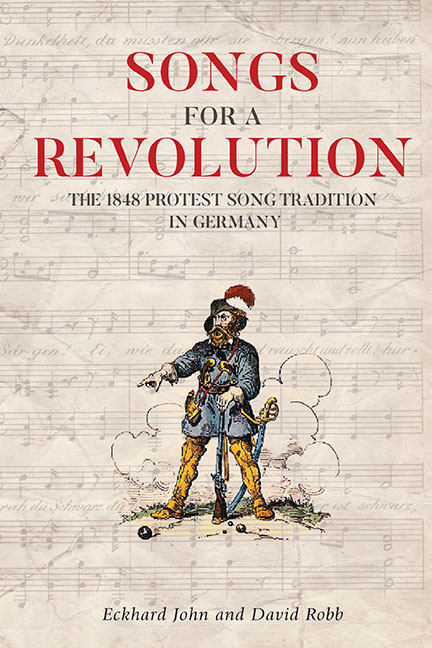Book contents
- Frontmatter
- Contents
- Preface
- Introduction: The Emergence of Political Song 1830–48
- Part I Before 1848: The Vormärz
- Part II 1848–49
- Part III 1848 in Memory
- Conclusion: The Making of Tradition; The Protest Songs of 1848 in the German Folk Revival 303
- Bibliography
- Discography
- Index of Names and Terms
- Index of Song Titles
15 - “Frisch auf zur Weise von Marseille” (“Reveille”)
Published online by Cambridge University Press: 23 October 2020
- Frontmatter
- Contents
- Preface
- Introduction: The Emergence of Political Song 1830–48
- Part I Before 1848: The Vormärz
- Part II 1848–49
- Part III 1848 in Memory
- Conclusion: The Making of Tradition; The Protest Songs of 1848 in the German Folk Revival 303
- Bibliography
- Discography
- Index of Names and Terms
- Index of Song Titles
Summary
“FRISCH AUF ZUR WEISE VON MARSEILLE” (Rise Up to the Tune of the Marseillaise), more commonly known as “Reveille” (Wake Up), was written in 1849 by Ferdinand Freiligrath to commemorate the first anniversary of the March revolution of 1848. With its direct reference to the “Marseillaise,” the author intentionally invoked the spirit of the French Revolution in his call for a new, more radical rebellion. After the final failure of the revolution in 1849, the song's circulation was confined to circles of political émigrés abroad. Freiligrath's “Reveille” did not resurface until after the revolution of 1918, when it was adapted by Hermann Scherchen as a choral piece for the workers’ movement. In the early years of the GDR it was revived as an example of a historical worker’s Kampflied (battle song).
On March 19, 1849, a banquet took place in Cologne commemorating the Berlin barricade battles of twelve months before. Organized by the Cologne Demokratischer und Arbeiter-Verein (Democratic Workers’ Association), the event in Gürzenich was attended by over 5000 people and featured speeches against a backdrop of music, beer-drinking, and general festivities. Der Wächter am Rhein reported how the call went up for “eine zweite Volkserhebung” (a second popular revolt), a demand that was also featured in a newly written text by Ferdinand Freiligrath to the tune of the “Marseillaise.” Performed on the day, it chimed with the revolutionary spirit of the occasion and, according to the Neue Rheinische Zeitung, was received “mit donnerndem Beifall” (with thunderous applause). This demonstrative application of a symbol of the French Revolution was also reflected in other aspects of the banquet: for example, in the typical Jacobin attire of Phrygian caps worn by the hall attendants. These decked the stage alongside a big red flag. This was the setting for the first large public performance of Freiligrath's song, which was published in oppositional magazines of the Rhineland shortly after.
Freiligrath's lyrics reflected the song's political function: it was intended as a “Reveille der neuen Revolution” (a wake-up call for the new revolution). Here the author reconnected with ideas he had already formulated in “Die Todten an die Lebenden” (The Dead to the Living) from the summer of 1848. In this poem, Freiligrath had expressed a sense of obligation towards the victims of the March uprising to reawaken the revolutionary “Grimm” (fury) in order to complete the “halbe Revolution” (half revolution).
- Type
- Chapter
- Information
- Songs for a RevolutionThe 1848 Protest Song Tradition in Germany, pp. 206 - 217Publisher: Boydell & BrewerPrint publication year: 2020

